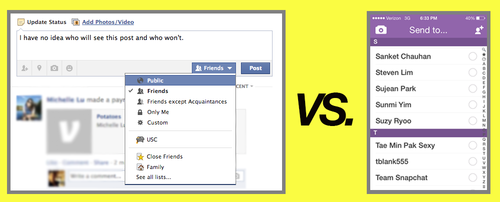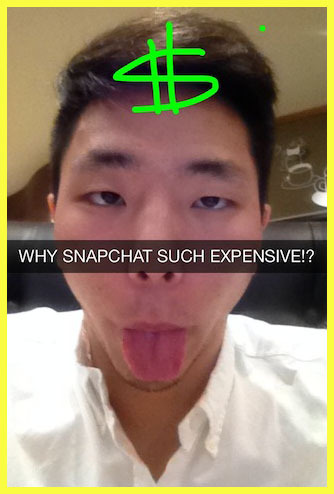Why Snapchat is Actually Undervalued [Op-ed]
![Why Snapchat is Actually Undervalued [Op-ed]](https://nextshark.b-cdn.net/wp-content/uploads/2013/11/snapchat-meme-625x320.jpg?width=1536&auto_optimize=medium&quality=85&blur=80)
![Why Snapchat is Actually Undervalued [Op-ed]](https://nextshark.b-cdn.net/wp-content/uploads/2013/11/snapchat-meme-625x320.jpg?width=1536&auto_optimize=medium&quality=85)
By Alex Park
Snapchat made headlines last week after rejecting multiple multi-billion-dollar, all-cash acquisition offers from Facebook, Google, and Tencent.
The news sparked a great deal of conversation in the tech/startup/venture communities. It was apparent that people weren’t sure who was more out of their minds: Snapchat, for turning down the offers, or the suitors, for making the offers.
But the biggest question on my mind was what Mark Zuckerberg, Eric Schmidt, and China’s Tencent saw in Snapchat that I, and seemingly the majority of the world, were largely oblivious to. Far be it from me to peg my own intelligence or perspective above theirs — so where did they see billions where I didn’t?
Then, moments after I’d fired off a few Snapchats to some friends, it hit me…
Here’s why $3-4B actually undervalues Snapchat:
Consider the conversations that you have with your best friends versus those you have with your mom. They’re very different, aren’t they? Your best friends know things about you that your mom might be better off not knowing. Between my best friend, my mom, that one classmate I’ve exchanged three words with four years ago, and my coworker, there are a ton of stories from my life that I would share with some and not with others. This isn’t to say that there aren’t some stories that have broad appeal, like getting married or graduating from college, but a fundamental truth about human relationships is that we relate with different people differently at different times and in different contexts.
What’s Social Media, Again??
Let’s go back to the basics for a moment, and simplify this down. Like any other form of media or expression, and like we just established, it’s important we consider our audience when using social media. Someone pretty smart described social media in this way:
“The essence of social media is knowing your audiences and engaging them in something they love.”
The fact of the matter is, social media gives us a platform to be storytellers. A good storyteller shares things that interest people. Otherwise, why share them? Why tell an irrelevant, uninteresting, meaningless story? Ain’t nobody got time for dat.
So that’s why being able to speak to (or select) your audience is actually really important, because, again, something that’s funny to your best friend might put your mom in the hospital.
This is where Snapchat nails, and where Facebook fails
Facebook vs. Snapchat

With Facebook: generally speaking, when I share something on Facebook, I have little idea who will see it and who won’t. I don’t really know who my audience is. It’s whoever Facebook’s predictive algorithm decides to show it to, at the intersection of whoever happens to be looking at their news feed at the particular time that it’s served up.
Enter Snapchat, the only major social network that allows the user to select with great precision which friends they share each story to. You get to choose exactly which friends see what.
Think about the last time you sent an ugly-faced Snapchat to a friend, or some pictures from the party, etc. After you finished with the picture, you went through a process of choosing who to send the picture to. And undoubtedly, you chose some people to send to, and some people not to send to. This makes a lot of sense because I don’t want to send this picture to someone I haven’t seen in 6 years.

That’s just weird. You shouldn’t do that.
I know what you’re thinking….
“How does this make Snapchat worth more than $4 billion?”
Well, let’s take a feature like a check-in, which Facebook supports. When you check in to a location, you’re really telling a story. You’re saying “I’m here, with these people, experiencing this.”
But the act of telling that story is not limited to the medium of a Check-In, is it? No, it can actually be expressed in a lot of different ways. For example, Snapchatting a picture of me at a coffee shop basically accomplishes the same thing, except that I can choose who I want to tell it to.
In other words, Snapchat allows me to share the same story, but in a better way (because I can choose the right audience to share the story with). It’s preferable, more intimate, and so, its better. It also means I’m going to post more. What does this mean? This means I won’t be checking in on Facebook anymore…Uh oh…
Now say the same thing happened across the rest of Facebook’s sharing features…What would the Facebook experience become if less and less people were sharing check-ins, status updates, photos, videos, links…
The more Snapchat continues to become a primary way that people express themselves, the less people will be going to Facebook to share their stories, which means Facebook will start to become less and less interesting, which means I’m going to start spending less and less time on Facebook. Eventually, people stop sharing altogether on Facebook (already happening) and Facebook activity begins to die by the same virality that gave it life.
The $$$$$$
Now let’s say you’re a ~$100B company, like Facebook, that makes its money primarily on two fronts: 1) selling advertisements and 2) selling user data.
This means your customers (the advertisers) see the value of advertising on your platform as directly correlated to how engaged your users are. So if another product suddenly begins stealing that engagement away, the value of advertising on your site goes down. What’s more, the value of our user data also drops. Revenues begin to drop a few percentage points, and suddenly, Facebook stock drops 3, 4, 5, 10 points…And, well, if you’re a $100B company, those 3, 4, 5, 10 points represent 3, 4, 5, 10 billions of dollars in value…Bingo! Suddenly Snapchat’s valuation starts making a lot more sense.
There’s no doubt that Mark Zuckerberg realizes this, and so does Evan Spiegel, CEO of Snapchat.
Because the reality is, Snapchat is not being valued for the money that it can make, but for the money it can take away (from Facebook).
That’s exactly why Google, owner of Google Plus, Facebook’s direct competitor, is bidding even higher. They realize this could be a huge way to hurt Facebook badly. Google realizes if they buy out Snapchat, let Snapchat do its thing, but with Google’s resources, it can inflict some serious damage.
That’s also why, Chinese company, Tencent, sees this as a serious opportunity to break the US’s control over the technology and communications platforms the majority of the world uses.
Snapchat is not valuable for the revenue it can generate, it’s valuable for the revenue it can threaten. Particularly Facebook’s.
Thoughts?
*Just for the record, I don’t think Facebook is going anywhere or that Snapchat will become the foremost social network. I think the future of social media continues to be a diverse one with room for multiple players making different products for different people to be used in different contexts. Facebook will continue to be the anchor, but they definitely need to buy out Snapchat or else they’ll be in for a lot of trouble later on.
Share this Article
Share this Article

